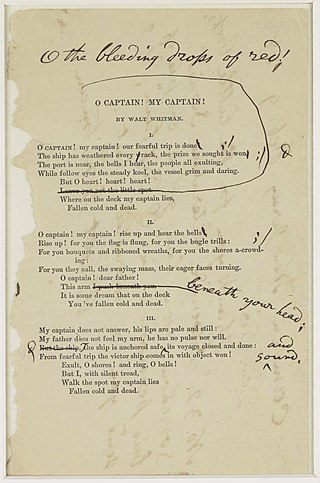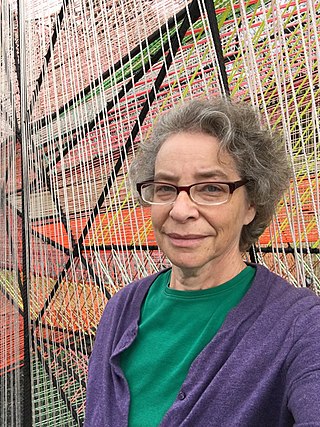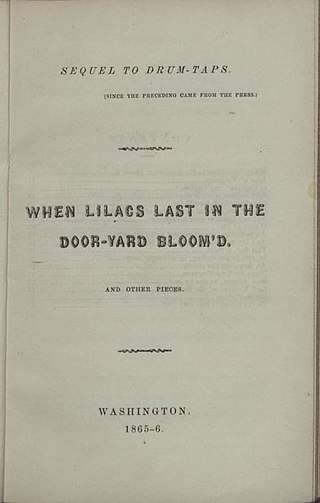Related Research Articles

Walter Whitman Jr. was an American poet, essayist, and journalist. He is considered one of the most influential poets in American history. Whitman incorporated both transcendentalism and realism in his writings and is often called the father of free verse. His work was controversial in his time, particularly his 1855 poetry collection Leaves of Grass, which was described by some as obscene for its overt sensuality.

Leaves of Grass is a poetry collection by American poet Walt Whitman. Though it was first published in 1855, Whitman spent most of his professional life writing, rewriting, and expanding Leaves of Grass until his death in 1892. Six or nine individual editions of Leaves of Grass were produced, depending on how they are distinguished. This resulted in vastly different editions over four decades. The first edition was a small book of twelve poems, and the last was a compilation of over 400.

"Song of Myself" is a poem by Walt Whitman (1819–1892) that is included in his work Leaves of Grass. It has been credited as "representing the core of Whitman's poetic vision."

"O Captain! My Captain!" is an extended metaphor poem written by Walt Whitman in 1865 about the death of U.S. president Abraham Lincoln. Well received upon publication, the poem was Whitman's first to be anthologized and the most popular during his lifetime. Together with "When Lilacs Last in the Dooryard Bloom'd", "Hush'd Be the Camps To-day", and "This Dust was Once the Man", it is one of four poems written by Whitman about the death of Lincoln.

"When Lilacs Last in the Dooryard Bloom'd" is a long poem written by American poet Walt Whitman (1819–1892) as an elegy to President Abraham Lincoln. It was written in the summer of 1865 during a period of profound national mourning in the aftermath of the president's assassination on 14 April of that year.
"Crossing Brooklyn Ferry" is a poem by Walt Whitman, and is part of his collection Leaves of Grass. It describes the ferry trip across the East River from Manhattan to Brooklyn at the exact location that was to become the Brooklyn Bridge.
M. C. Gardner is an American playwright, biographer, and cultural essayist. His given name is Michael Charles. He was born in Glendale, CA July 1, 1951. He is one of the founders and editors of the literary website AnotherAmerica.org. He currently resides in Los Angeles, CA.

"A Noiseless Patient Spider" is a short poem by Walt Whitman. It was originally part of his poem "Whispers of Heavenly Death", written expressly for The Broadway, A London Magazine, issue 10, numbered as stanza "3." It was retitled "A Noiseless Patient Spider" and reprinted as part of a larger cluster in Passage to India (1871). The poem was later published in Whitman's poetry collection Leaves of Grass. The poem has inspired other poets and musical compositions for its theme of the individual soul in relation to the world.

"Pioneers! O Pioneers!" is a poem by the American poet Walt Whitman. It was first published in Leaves of Grass in 1865. The poem was written as a tribute to Whitman's fervor for the great Westward expansion in the United States that led to things like the California Gold Rush and exploration of the far west.

"Hush'd Be the Camps To-Day" is a poem by Walt Whitman dedicated to Abraham Lincoln. The poem was written on April 19, 1865, shortly after Lincoln's assassination. Whitman greatly admired Lincoln and went on to write additional poetry about him: "O Captain! My Captain!", "When Lilacs Last in the Dooryard Bloom'd", and "This Dust Was Once the Man." "Hush'd" is not particularly well known, and is generally considered to have been hastily written. Some critics highlight the poem as Whitman's first attempt to respond to Lincoln's death and emphasize that it would have drawn comparatively little attention if Whitman had not written his other poems on Lincoln.

Kim Roberts is an American poet, editor, and literary historian who lives in Washington, D.C.

"This Dust Was Once the Man" is a brief elegy written by Walt Whitman in 1871. It was dedicated to Abraham Lincoln, the 16th president of the United States, whom Whitman greatly admired. The poem was written six years after Lincoln's assassination. Whitman had written three previous poems about Lincoln, all in 1865: "O Captain! My Captain!", "When Lilacs Last in the Dooryard Bloom'd", and "Hush'd Be the Camps To-Day".

Sequel to Drum-Taps: When Lilacs Last in the Dooryard Bloom'd and other poems is a collection of eighteen poems written and published by American poet Walt Whitman in 1865.

Elizabeth Porter Gould was an American poet, essayist, and suffragist who edited an early anthology of selections from Walt Whitman's work and wrote extensively on subjects related to education.
"There Was a Child Went Forth" is a poem written by Walt Whitman in 1855 and later included in the collection of poems entitled Autumn Rivulets. It is an account of a childhood, and is considered to be autobiographical. The poem presents a mixture of country and city scenes as the poet records his memories of early domestic scenes and Frank pen portraits of his parents. This poem also reveals his inclination towards his mother more than his father.

Donald Kummings was an American professor, poet and scholar of literature, best remembered for his research on poet Walt Whitman. For 36 years he served as a professor of English at University of Wisconsin–Parkside.
William White was an American journalist, writer, educator and literary historian. He was professor of Journalism and American Studies at Wayne State University from 1947 to 1980, and set up and chaired the journalism program at Oakland University. He edited collections of the works of Walt Whitman, A. E. Housman, and Ernest Hemingway, and wrote over forty books and thousands of articles. In 1969, he was reputed to own the world's largest collection of books published by Hemingway.

The American poet Walt Whitman greatly admired Abraham Lincoln, the 16th president of the United States, and was deeply affected by his assassination, writing several poems as elegies and giving a series of lectures on Lincoln. The two never met. Shortly after Lincoln was killed in April 1865, Whitman hastily wrote the first of his Lincoln poems, "Hush'd Be the Camps To-Day". In the following months, he wrote two more: "O Captain! My Captain!" and "When Lilacs Last in the Dooryard Bloom'd". Both appeared in his collection Sequel to Drum-Taps later that year. The poems—particularly "My Captain!"—were well received and popular upon publication and, in the following years, Whitman styled himself as an interpreter of Lincoln. In 1871, his fourth poem on Lincoln, "This Dust Was Once the Man", was published, and the four were grouped together as the "President Lincoln's Burial Hymn" cluster in Passage to India. In 1881, the poems were republished in the "Memories of President Lincoln" cluster of Leaves of Grass.
"The Sleepers" is a poem by Walt Whitman. The poem was first published in the first edition of Leaves of Grass (1855), but was re-titled and heavily revised several times throughout Whitman's life.
References
- ↑ Bradley et al. 1980, pp. xvii–xviii.
- ↑ LeMaster, J. R.; Kummings, Donald D. (1998). Walt Whitman: An Encyclopedia. Routledge. pp. 370–371. ISBN 978-0-8153-1876-7.
- ↑ "John B. Mason, "Passage to India (1871)" (Criticism)". The Walt Whitman Archive. Retrieved 2021-09-07.
- ↑ "A Passage to India, by Walt Whitman". PBS LearningMedia. Retrieved 2021-09-07.
- ↑ "Walt Whitman's 'Passage to India'". British Library. Retrieved 2021-09-07.
